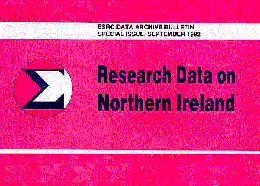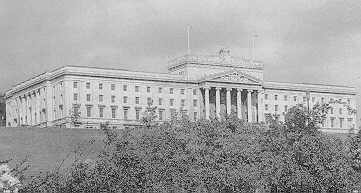
CAIN Web Service
ESRC Data Archive Bulletin:
Research Data on Northern Ireland
[CAIN_Home]
[Key_Events]
Key_Issues]
[Conflict_Background]
Text: Named Authors ... Page Compiled: Fionnuala McKenna
Material is added to this site on a regular basis - information on this page may change
The following has been contributed by the authors with the permission
of the editors and the publishers. The views expressed do not necessarily
reflect the views of the members of the CAIN Project. The CAIN Project
would welcome other material which meets our guidelines
for contributions.
These chapters will also be available as a downloadable document which
can saved and opened in 'Word'.

ESRC DATA ARCHIVE BULLETIN
Research Data on Northern Ireland
Special Issue of the ESRC Data Archive Bulletin
September 1992
Edited by:
Bridget Winstanley
Kathy Sayer
Rowan Currie
Published by:
ESRC Data Archive
University of Essex
Colchester
CO4 2SQ
ISSN 0307-1391
These chapters are copyright of the authors 1992, and are included on
the CAIN site by permission of the publishers. You may not edit, adapt,
or redistribute changed versions of this for other than your personal use
without the express written permission of the publishers. Redistribution
for commercial purposes is not permitted.
ESRC
DATA ARCHIVE
BULLETIN
Research Data on Northern
Ireland
Special Issue of the ESRC
Data Archive Bulletin September 1992
Editorial Team:
Editor: Bridget Winstanley
Associate Editor: Kathy Sayer
Production Editor: Rowan Currie
Published by the
ESRC Data Archive
University of Essex
Colchester C04 2S0
U.K.
Tel: 0206 872001
Internat'l: 44 206 872001/872103
Telex: 98440 (UNILIB G)
Fax: 0206 872003
Electronic Mail: ARCHIVE @ UK.AC.ESSEX
(Yellow Book Transport Service):
ARCHIVE @ 234220641141 .SXKL 10.FTP.MAIL
Origination by Robin Graygoose
Printed by Alphaprint (Colchester) Ltd
ISSN 0307-1391
[The photograph of Stormont on page 1
is published by courtesy of the Northern Ireland Tourist Office,
Belfast.]
Research Data on
Northern Ireland
Special Issue of the ESRC Data Archive Bulletin

Foreword
The ESRC Data Archive has a remit to cover the whole of the United Kingdom
and we are anxious to ensure that all social and economic researchers obtain
access to relevant data irrespective of their location. Because we were
concerned that our coverage of the strategic datasets relating to Northern
Ireland was poor, we have made a special effort over the last few months
to improve our holdings of Northern Irish data.
Derek Bond and his colleagues from both the University of Ulster and
the Queen's University of Belfast have been very helpful in informing us
of their data needs and assisting in negotiating access to data. The interest
and co-operation of Northern Ireland civil servants bodes well for future
research. Their willingness, and that of and academic researchers, to contribute
to this special issue of the Bulletin testifies to the interest
shown by the Northern Ireland research community in improving access to
data.
In order to encourage the use of Northern Irish data and comparable
datasets, we present our readers with this special issue of the Bulletin.
Denise Lievesley
Director
ESRC Data Archive
Return to Contents
Introduction
Derek Bond and Bob Osborne
ESRC Northern Ireland Regional Research Laboratory and University of
Ulster
Since Northern Ireland provides socio-economic
researchers with many interesting and often unique problems,
various initiatives designed to encourage high quality research into socio-economic
issues in Northern Ireland have been implemented. A major practical problem
encountered by these initiatives has been knowledge of and access to secondary
socio-economic data for Northern Ireland. Because of its unique constitutional
position the collection, collation and dissemination of most major Government
surveys are the responsibility of Departments within the Northern Ireland
Civil Service rather than the Imperial Civil Service. Thus, access to most
Northern Ireland data needs to be negotiated separately. A result of this
is the unintentional exclusion of Northern Ireland data from national data
holdings. Access to many of these datasets has been possible only through
'local knowledge' which clearly hinders
the development of high quality research on Northern Ireland. This shortcoming
has been recognised by the ESRC and various research projects, including
the ESRC Regional Research Laboratory initiative, have attempted to ameliorate
the problem. With the completion of the main phase of the ESRC Regional
Research Laboratories initiative, it is an opportune time to review the
situation.
There are many factors complicating the development
of access to datasets in Northern Ireland. The legality of granting access
to government-collected data, particularly prior to the implementation
of the Data Protection Act, has been a grey area. The political situation
has always made the collection of social data and the normal constraints
of confidentiality more pertinent in Northern Ireland than in Great Britain
(as highlighted during the collection of the 1981 Census at the height
of the Hunger Strikes). Government statisticians, often working under pressure,
have been understandably concerned that any data released to outside analysts
should be well- documented and of a uniformly high quality and have found
it difficult to divert limited resources from the completion of their own
studies to the preparation of datasets for outside researchers.
Some of these issues are discussed in the next
section by Edgar Jardine, head of the Social Statistics Division of the
Policy Planning and Research Unit of the Department of Finance and Personal
(NI). In particular, he gives an overview of both the organisational structures
and official environment under which the Government in Northern Ireland
collects and disseminates both social surveys and economic statistics.
This is followed by a series of brief reviews by leading Northern Ireland
academics concerning the large-scale continuous datasets for Northern Ireland.
These are grouped by availability through the Data Archive. The first three
on Family Expenditure Survey, Labour Force Survey and Northern Ireland
Social Attitudes Survey are available through the Archive on a comparable
basis with their British counterparts. The next group, the Continuous Household
Survey, Crime Statistics and the Building Society and Mortgage Survey,
Personal Income and Wealth Data and Demographic Data, while available in
part through the Archive, have markedly different coverage and structure
from their counterparts. The final two subjects, Housing and Education
do not currently have comparable data available through the Archive.
A common theme is the changing climate under which
data are collected in Northern Ireland. The major implication of this is
that datasets might continue to be inaccessible to researchers because
of the need Government Departments and Agencies to charge an 'economic
price' to users. This issue will re-emerge as other datasets
are considered in further articles. A further series of articles, organised
by the Northern Ireland Regional Research Laboratory and the Centre for
Policy Research at the University of Ulster, on Northern Ireland data sources
and their accessibility is planned. Datasets such as the Northern Ireland
census of Population and the Postal Address File will
be discussed. Also planned are articles on economic statistics, agricultural
statistics, historical archive material and one-off surveys. A final word
of warning to those about to embark on an exploration of Northern Ireland
data is that the terms 'Great Britain' and 'United Kingdom'
are sometimes erroneously used. Great Britain, of course, excludes Northern
Ireland whereas the United Kingdom consists of Great Britain and Northern
Ireland. Inexact usage of this terminology may lead to difficulties when
trying to establish whether a dataset includes Northern Ireland.
Return to Contents
| 
